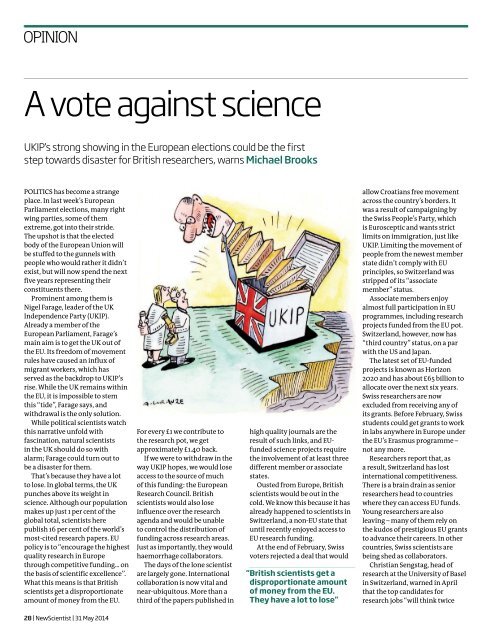New Scientist - 31 May 2014.bak
New Scientist - 31 May 2014.bak
New Scientist - 31 May 2014.bak
You also want an ePaper? Increase the reach of your titles
YUMPU automatically turns print PDFs into web optimized ePapers that Google loves.
OPINION<br />
A vote against science<br />
UKIP’s strong showing in the European elections could be the first<br />
step towards disaster for British researchers, warns Michael Brooks<br />
POLITICS has become a strange<br />
place. In last week’s European<br />
Parliament elections, many right<br />
wing parties, some of them<br />
extreme, got into their stride.<br />
The upshot is that the elected<br />
body of the European Union will<br />
be stuffed to the gunnels with<br />
people who would rather it didn’t<br />
exist, but will now spend the next<br />
five years representing their<br />
constituents there.<br />
Prominent among them is<br />
Nigel Farage, leader of the UK<br />
Independence Party (UKIP).<br />
Already a member of the<br />
European Parliament, Farage’s<br />
main aim is to get the UK out of<br />
the EU. Its freedom of movement<br />
rules have caused an influx of<br />
migrant workers, which has<br />
served as the backdrop to UKIP’s<br />
rise. While the UK remains within<br />
the EU, it is impossible to stem<br />
this “tide”, Farage says, and<br />
withdrawal is the only solution.<br />
While political scientists watch<br />
this narrative unfold with<br />
fascination, natural scientists<br />
in the UK should do so with<br />
alarm; Farage could turn out to<br />
be a disaster for them.<br />
That’s because they have a lot<br />
to lose. In global terms, the UK<br />
punches above its weight in<br />
science. Although our population<br />
makes up just 1 per cent of the<br />
global total, scientists here<br />
publish 16 per cent of the world’s<br />
most-cited research papers. EU<br />
policy is to “encourage the highest<br />
quality research in Europe<br />
through competitive funding... on<br />
the basis of scientific excellence”.<br />
What this means is that British<br />
scientists get a disproportionate<br />
amount of money from the EU.<br />
For every £1 we contribute to<br />
the research pot, we get<br />
approximately £1.40 back.<br />
If we were to withdraw in the<br />
way UKIP hopes, we would lose<br />
access to the source of much<br />
of this funding: the European<br />
Research Council. British<br />
scientists would also lose<br />
influence over the research<br />
agenda and would be unable<br />
to control the distribution of<br />
funding across research areas.<br />
Just as importantly, they would<br />
haemorrhage collaborators.<br />
The days of the lone scientist<br />
are largely gone. International<br />
collaboration is now vital and<br />
near-ubiquitous. More than a<br />
third of the papers published in<br />
high quality journals are the<br />
result of such links, and EUfunded<br />
science projects require<br />
the involvement of at least three<br />
different member or associate<br />
states.<br />
Ousted from Europe, British<br />
scientists would be out in the<br />
cold. We know this because it has<br />
already happened to scientists in<br />
Switzerland, a non-EU state that<br />
until recently enjoyed access to<br />
EU research funding.<br />
At the end of February, Swiss<br />
voters rejected a deal that would<br />
“British scientists get a<br />
disproportionate amount<br />
of money from the EU.<br />
They have a lot to lose”<br />
allow Croatians free movement<br />
across the country’s borders. It<br />
was a result of campaigning by<br />
the Swiss People’s Party, which<br />
is Eurosceptic and wants strict<br />
limits on immigration, just like<br />
UKIP. Limiting the movement of<br />
people from the newest member<br />
state didn’t comply with EU<br />
principles, so Switzerland was<br />
stripped of its “associate<br />
member” status.<br />
Associate members enjoy<br />
almost full participation in EU<br />
programmes, including research<br />
projects funded from the EU pot.<br />
Switzerland, however, now has<br />
“third country” status, on a par<br />
with the US and Japan.<br />
The latest set of EU-funded<br />
projects is known as Horizon<br />
2020 and has about £65 billion to<br />
allocate over the next six years.<br />
Swiss researchers are now<br />
excluded from receiving any of<br />
its grants. Before February, Swiss<br />
students could get grants to work<br />
in labs anywhere in Europe under<br />
the EU’s Erasmus programme –<br />
not any more.<br />
Researchers report that, as<br />
a result, Switzerland has lost<br />
international competitiveness.<br />
There is a brain drain as senior<br />
researchers head to countries<br />
where they can access EU funds.<br />
Young researchers are also<br />
leaving – many of them rely on<br />
the kudos of prestigious EU grants<br />
to advance their careers. In other<br />
countries, Swiss scientists are<br />
being shed as collaborators.<br />
Christian Sengstag, head of<br />
research at the University of Basel<br />
in Switzerland, warned in April<br />
that the top candidates for<br />
research jobs “will think twice<br />
28 | <strong>New</strong><strong>Scientist</strong> | <strong>31</strong> <strong>May</strong> 2014


